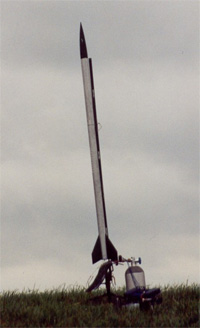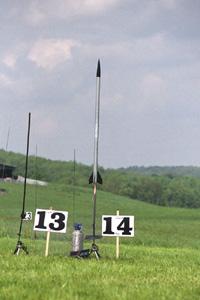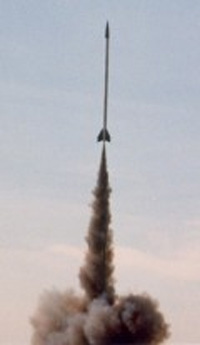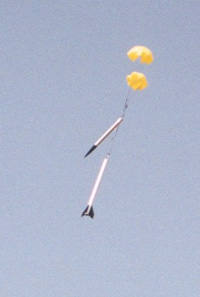| Manufacturer: | Modification |
 Brief:
Brief:
Hybrid motors have always fascinated me. The extra complexity of a fuel and oxidizer in different states and trying to get them to combust makes adds a new challenge to rocketry. Also, since the fuel is inert, there are no permits required for storage, and ideally (except for Aerotech) require no haz-mat fee for shipping. Until recently, the only hybrid motors on the market are in the Level 2 range and above. The Hypertek system required expensive ground support system, and you must have a tank of N20 and O2 on the field. Aerotech.s system had the advantage of allowing you to fill the tank before coming to the launch, but had the disadvantage of having a complex pyrotechnic valve system that is expensive, complex to set up, and requires a haz mat fee for shipping.
Recently, hybrid technology has come down to the Level 1 arena. Ratts Work.s was the first company that offered a certified hybrid system that any level 1 user can use. The ground support is pricey, but the design of the motor is a lot simpler than what Aerotech and Hypertek have to offer. The reload kits do not require a hazmat fee, but they do not come with igniters or pre-heater charges. However, some dealers (ie Pratt Hobbies) throw these components into the kit for you. The Ratts Work Hybrid motors are designed to fit in a 29mm motor tube, with slight modification to the rocket for venting. Also, the fuel tank is the same cylinder as the oxidizer tank. The fuel and oxidizer are separated by a .floating bulkhead.. The fuel is consumed from the top to the bottom. This means that the pressure of the N2O pushes the bulkhead down as the fuel is consumed. They have three motor designations, H70, I80, and I90. The H70 and I80 use the same size grain, but the case is longer.
Construction:
I won a H70 case and a few loads on a ROL auction. Robert Galjes already had the ground support system for the RATT's work system and offered CMASS members access to it, so the only thing that I required for it was a rocket to fly it in. The H70 has a 3 second burn time, and only has a total impulse of about 180 n/s. I wanted a rocket that was light enough to launch with the motor, and the added weight of the recovery hardware, and stay within 2000 ft so I can don.t risk loosing the rocket in the tree filled New England area. I decided that the Aerotech Mirage was the perfect candidate. It can launch on a motor as small as a F25, and with my calculations, will go about 1,500 ft with a 180 n/s motor. My fifteen year old friend Ryan Sebastian wanted to help out with the project, so he became my partner in designing, and building the rocket.
 There were a couple conditions that I wanted for this rocket. It had to carry electronics to deploy the recovery system. I wanted to put a bulkhead near the engine that will hold the charge, yet protect it from any leaking N2O. But I also want the option of launching the model with conventional motors. So the charge bulkhead had to be removable. Because of this, the three sections of the Mirage have to be removable. I decided to use screws to hold the rocket together.
There were a couple conditions that I wanted for this rocket. It had to carry electronics to deploy the recovery system. I wanted to put a bulkhead near the engine that will hold the charge, yet protect it from any leaking N2O. But I also want the option of launching the model with conventional motors. So the charge bulkhead had to be removable. Because of this, the three sections of the Mirage have to be removable. I decided to use screws to hold the rocket together.
The Hybrid Mirage was built with three main sections. The Booster Section, Parachute Bay, and Payload section. The Motor Section is the lower section of the Aerotech Mirage, and is heavily modified. The motor hook is still used, but the motor hook is trimmed to allow the longer H70 motor to pass beyond the motor hook. It is attached in the position that the hook locks over the aft closure of the Hybrid, and standard 29mm High Power motor. Also, this section has the venting tube permeably attached to the airframe.
The parachute bay, obviously, is where the recovery system of the rocket is kept. It is also the section that the ejection bulkhead is attached to. A paper ring is attached inside the tube so the forward face of the bulkhead rests against it. When the booster section is attached, the tube coupler presses the bulkhead against the ring. This creates a nice seal between the motor bay and the parachute bay. When the Mirage is flown with a regular motor, the bulkhead is simply omitted.
The Payload Section of the rocket is mostly empty space. The electronics for the recovery system is located in the tube coupler. I decided that I would use my custom built timer for recovery. I designed the timer to use a .burn wire. to start the timer. To utilizes this, I had a couple short bolts sticking out of the side of the rocket. Each bolt is a terminal which a .jumper. wire is connected too. The jumperwire is fastened to the launch rod. When the Mirage takes off, the jumper pulls free from the bolt, thus starting the timer.
 Flight:
Flight:
The first opportunity to try out the Hybrid Mirage came on July 27th, 2002. It did not work very well though. There was a N2O leak in the vent tube. The N2O filled the motor section, and spread into the parachute compartment. Just before the countdown for ignition was started, the N2O in the parachute compartment pushed the payload section off the rocket, which started the timer. The countdown was aborted, and the N2O dump button was pushed. While the oxidizer was being drained, the charge went off. Paper, Wood, Oxidizer.... now a heat source? You guest it. Fire. For about five seconds, the insides of the parachute compartment was engulfed in flame. I did not know this until I dismantled the rocket, hoping to reload it. The charge bulkhead was completely chard. It disintegrated just by handling it. About a quarter of the inside wall of the body tube was burned away from the heat.
 When the Sept 14th rocket launch came, Ryan and I decided to launch the Hybrid Mirage again. Robert Galjes could not make it to the launch with the ground support equipment and the tank of N2O, so Ryan and I decided to launch it with a conventional motor, a G75-10J. I decided to arm the timer too& just to make sure it works. The lift off of the Hybrid Mirage was beautiful. The black and silver rocket streaking skyward, leaving behind a dark smoke trail& nice :-). The timer deployed both chutes right at apogee, and the rocket recovered without a scratch.
When the Sept 14th rocket launch came, Ryan and I decided to launch the Hybrid Mirage again. Robert Galjes could not make it to the launch with the ground support equipment and the tank of N2O, so Ryan and I decided to launch it with a conventional motor, a G75-10J. I decided to arm the timer too& just to make sure it works. The lift off of the Hybrid Mirage was beautiful. The black and silver rocket streaking skyward, leaving behind a dark smoke trail& nice :-). The timer deployed both chutes right at apogee, and the rocket recovered without a scratch.
At NSL 2003, Ryan and I launched our Hybrid Mirage with the motor we built it for. To prevent the same problem we had last time, I secured the vent hose to the motor with hot melt glue. Blue Thunder propellant cut off a F39, and a Magnelite igniter was used to start the motor. The H70 motor ignited instantly, and lofted the Mirage off the pad with ease. Beautiful motor; small bright flame, very little smoke. I don.t think it burned for the full three seconds, maybe the N2O tank was to warm, so the motor did not get a full fill of oxidizer. The timer deployed both chutes a couple seconds after apogee, ending its perfect flight.
Summary:
Overall, the Hybrid Mirage project was a success. We built a rocket that could fly on a Hybrid motor, and convention motor. Future plans include more H70 launches with a PICO altimeter, and don't be surprised if you see a I80 case in my hands in the near future ;-).
Related Products
Sponsored Ads
 |
 |











